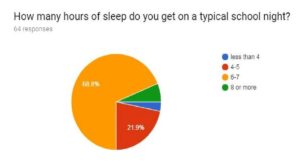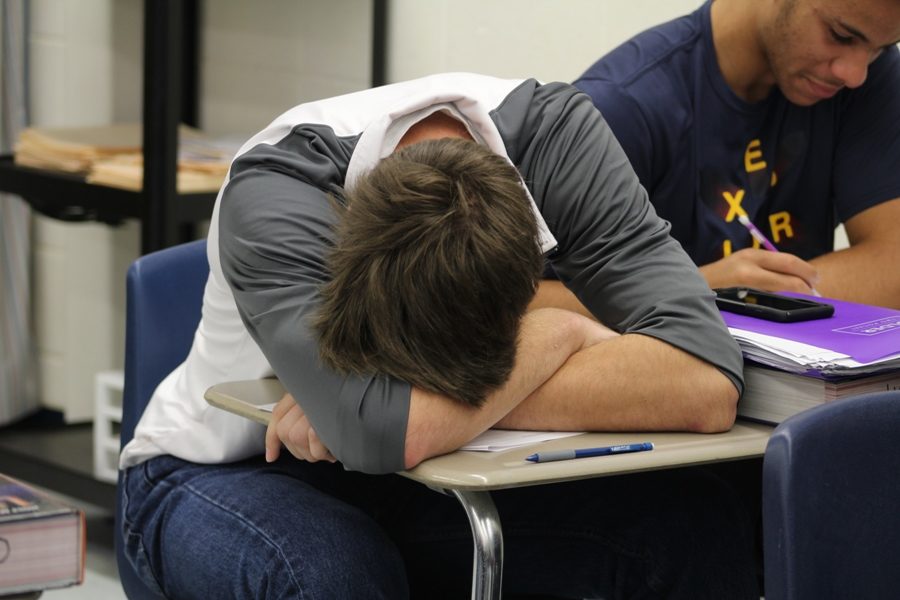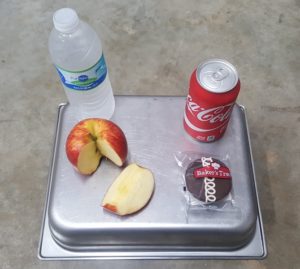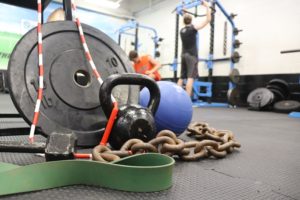Sleep and exercise battle for students’ time
Finding a student catching up on lost sleep while in class is not an uncommon sight in most high school classrooms. Getting fewer hours of rest at night makes it much easier to have less motivation in school and other activities.
November 2, 2017
The majority of high school students today have become accustomed to sacrificing hours of sleep and the benefits of exercise for endless lists of homework assignments and other commitments that demand constant devotion. Although sleep and exercise are some of the most fundamental and beneficial actions that individuals need to be healthy, they are typically the first to be abandoned when it comes to completing everything on the to-do list.
The National Sleep Foundation reported that active teenagers should get anywhere from 8 to 10 hours of sleep to be fully functioning. According to an anonymous Starr’s Mill poll, on average, about 85% of students get between 4 and 7 hours of sleep per school night, and only 6% reported getting 8 or more hours of sleep.

Needless to say, most students are lacking when it comes to a complete night’s rest. This not only leads to a decreased ability to function and focus on activities throughout the school day, but also less motivation outside of school, and thus the cycle of sleep deprivation begins.
This lack of sleep is not where it ends. About 65% of students who participated in the Starr’s Mill poll claimed that they typically exercise during the school week outside of school sports and activities. Not only do most young people deprive themselves of the necessary amount of rest, but also decide to workout on top of this. The question that these students tend to face is where to draw the line between choosing to sleep a little longer or heading to the gym.
Sleep and exercise are directly related, so choosing to do or not to do one will affect the other. More rest at night tends to allow for better workouts, while more exercise also increases quality of sleep. Most students agree that the amount of sleep they get affects how often they workout “Exercise is healthy,” one respondent to the poll said. “I make it a priority to do it and will myself to stick to my workout schedule.”
This type of motivation and balance, especially in high school, is hard to find for the majority of students, so it is not uncommon to see students prioritizing their activities differently and squeezing in exercise and sleep whenever possible. “If I have not received enough sleep that night, exercising seems more like a nuisance,” another student said. “However, if I am well-rested, I tend to exercise more.”
The key for finding balance is completely dependent upon the individual. Because sleep and exercise go hand-in-hand, paying attention to the signs of one’s body may help in deciding whether to sleep in or head to the gym. Missing a few days of exercise in order to catch up on lost sleep is not something to stress over, especially as a student.
“On days I get more sleep I often feel more motivated to exercise, but sometimes I’m just too busy or tired,” another respondent said. This is a healthy approach to take by eliminating some stress from an already busy schedule and making a personal decision on what should be prioritized that day.
Sleep and exercise are significant components of human health and should not constantly be at battle for time in a student’s life. Whether fitting in a quick workout or deciding to hit the snooze button a few more times, remembering that a healthy body and mind is the main goal can help when finding a good balance between the two.








